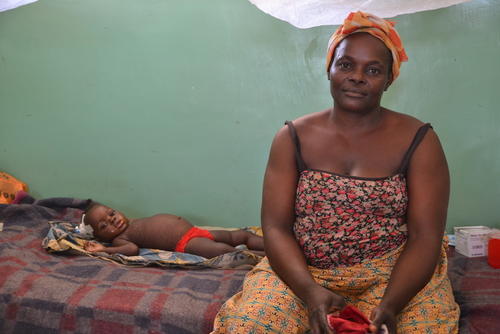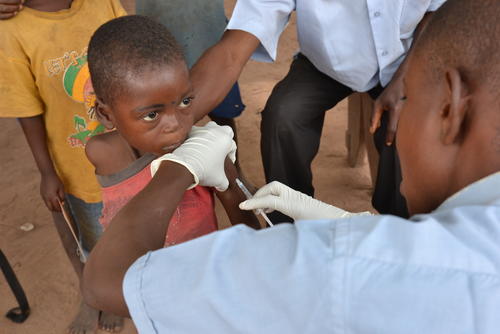Since November 2016, Médecins Sans Frontières has vaccinated over 675,000 children against measles, and cared for more than 14,000 patients in health zones throughout five provinces in the Democratic Republic of the Congo (DRC): Maniema, South Kivu, Tanganyka, Ituri and Equateur.
MSF teams are currently supporting the Ministry of Health’s fight against measles. “We are facing a serious situation that requires a significant response effort. Time is of the essence for everyone involved: MSF, the Congolese authorities and other partners”, explains Jeroen Beijnsberger, head of the MSF mission in Kinshasa. “We need to react quickly and decisively to prevent the spread of this highly contagious disease.”
To guarantee effective immunisation coverage (the vaccination of 95% of children aged 6 months to 14 years) the teams must cover even the most remote areas. In a country as huge as the DRC, which also lacks road infrastructure, this can mean travelling hundreds of kilometres on motorbike, crossing rivers in dugout canoes, or walking for days through an inhospitable forest.
“To reach the village of Yalombe, I and three colleagues had to walk for six days, there and back, in the Lomami Park forest”, said Daniel Cibangu, a nurse with one of the MSF teams working in Maniema province. “We slept outdoors in the middle of the forest and had to ration our food supplies. We had to walk 120km through tall grasses covered in ants that sometimes got into our underwear. Sometimes, we had no choice but to jump over old fallen trees that blocked our route. All of that was necessary to reach the village where our teams had to vaccinate more than 1,600 children.”
Logistics can be particularly challenging in more dangerous regions affected by the presence of armed groups, such as South Kivu and Tanganyka.

Vaccination: the best weapon against measles
In addition to immunisation campaigns, MSF teams are delivering medical care to measles patients, mainly children under the age of ten, providing outpatient treatment of symptoms, with a particular focus on malnourished children suffering from measles, as they are particularly vulnerable.
“When measles arrived in our village, a lot of children died, especially when the parents turned to traditional medicine. But those who rushed to the health centres were able to see that their children were saved,” explains Mwayuma Ramazani in the Kindu general referral hospital in Maniema province, where her child was hospitalised for measles complications. “I learned that MSF was there to help, so when my child got a fever I decided to go to the health centre. When I arrived at the centre, the MSF mobile team took us to the hospital.”
“In Manono, in Tanganyka province, nearly 900 children were hospitalised in January”, says Gaudia Storni, MSF field manager. “Malnutrition is still a problem: malnourished children are weak and particularly susceptible to different illnesses, including measles.”
Since November 2016, MSF teams have cared for more than 14,000 children in the provinces where they work.
According to the World Health Organization (WHO), in recent years the Democratic Republic of the Congo has had some success fighting measles. The number of cases fell by more than 95% between 2011 and 2015.
However, the country has also suffered from major measles epidemics: according to a study published in the journal Conflict and Health, between 2011 and 2013, an outbreak affected 300,000 children, 5,000 of whom died. At the time, 13 million children were vaccinated in response, 3 million of them by MSF. In 2017, the epidemic flared up again with more than 13,000 new cases reported. However, the strong international commitments on vaccination from the WHO, the Conference of African Ministers of Health and different partners must be acted upon for there to be any hope of eliminating measles by 2020.
MSF has been active in DRC for 35 years, supporting the Ministry of Health in eleven provinces, providing healthcare to victims of conflict and violence, to displaced people or to those suffering from epidemics or pandemics such as HIV/AIDS. Furthermore, the emergency response teams are ready to respond across the entire territory in case of an outbreak of a contagious disease, a natural disaster or conflict.



